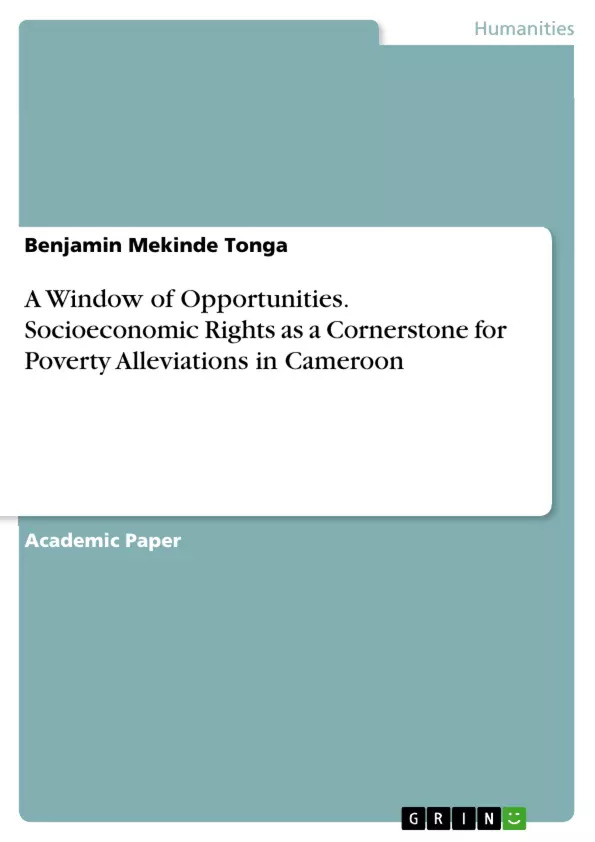This paper contends that there is an intrinsic relationship between poverty and socioeconomic rights. The positive impact of socioeconomic rights on alleviating poverty can be improved upon through a change of attitudes from neglect to more emphasis on the implementation of socioeconomic rights, owing to the prospects it offers in achieving zero poverty in Cameroon..
The purpose of this assignment includes, among other things, to explore the meaning of poverty and its underlying pointers in Cameroon and to discuss the nexus between poverty and socioeconomic rights in Cameroon by contending that fighting poverty is primarily based on the ability to guarantee and enforce socioeconomic rights. Furthermore, it aims to to explain the challenges in implementing socioeconomic rights and combating poverty in Cameroon and to advance socioeconomic related policy recommendations as a stronghold towards poverty alleviation in Cameroon.
Inhaltsverzeichnis (Table of Contents)
- INTRODUCTION
- WHAT IS POVERTY AND WHAT ARE THE UNDERLING INDICATORS IN CAMEROON
- THE NEXUS BETWEEN POVERTY AND SOCIO-ECONOMIC RIGHTS IN CAMEROON
- LIMITATION TO THE OBLIGATION TO PROVIDE FOR SOCIO-ECONOMIC RIGHTS
- CHALLENGES/ PROSPECTS IN COMBATING POVERTY THROUGH THE ENFORCEMENT OF SOCIO-ECONOMIC RIGHTS IN CAMEROON
- RECOMMENDATIONS
Zielsetzung und Themenschwerpunkte (Objectives and Key Themes)
This paper examines the connection between poverty and socio-economic rights in Cameroon, highlighting the crucial role of these rights in alleviating poverty. The author argues that neglecting socio-economic rights has significantly contributed to the rise of poverty in the country. This paper aims to explore the definition of poverty in Cameroon, analyze the relationship between poverty and socio-economic rights, discuss challenges and prospects in combating poverty through the enforcement of socio-economic rights, and provide recommendations for addressing poverty through policy changes.
- The definition and measurement of poverty in Cameroon
- The nexus between poverty and socio-economic rights
- Challenges in implementing socio-economic rights and combating poverty
- Prospects for poverty reduction through socio-economic rights enforcement
- Policy recommendations for poverty alleviation in Cameroon
Zusammenfassung der Kapitel (Chapter Summaries)
- Introduction: This chapter introduces the central argument of the paper, highlighting the significant role of socio-economic rights in alleviating poverty in Cameroon. The author emphasizes the importance of enforcing these rights as a pathway toward achieving the Sustainable Development Goal (SDG) of zero poverty.
- What is Poverty and What are the Underlying Indicators in Cameroon: This chapter delves into the definition of poverty, examining different perspectives and analyzing the multifaceted nature of poverty. The chapter then explores the key poverty indicators in Cameroon, outlining the country's challenges with poverty and its impact on various aspects of life, such as health, education, and employment.
- The Nexus Between Poverty and Socio-Economic Rights in Cameroon: This chapter examines the intricate relationship between poverty and socio-economic rights. The author argues that the lack of access to essential resources and capabilities, which are often guaranteed by socio-economic rights, can be a significant contributor to poverty. The chapter also highlights the international frameworks, such as the International Covenant on Economic, Social and Cultural Rights (ICESCR), that recognize poverty as a human rights issue.
Schlüsselwörter (Keywords)
The key concepts and terms discussed in this paper include poverty, socio-economic rights, human rights, poverty alleviation, Cameroon, development, SDG Goal 1 (Zero Poverty), International Covenant on Economic, Social and Cultural Rights (ICESCR), access to healthcare, education, employment, and policy recommendations.
Frequently Asked Questions
What is the relationship between poverty and socioeconomic rights in Cameroon?
The paper argues there is an intrinsic relationship; fighting poverty is primarily based on the ability to guarantee and enforce socioeconomic rights.
What are the main indicators of poverty in Cameroon?
The study explores indicators such as lack of access to healthcare, education, and employment, which impact the country's development.
Which international frameworks recognize poverty as a human rights issue?
The International Covenant on Economic, Social and Cultural Rights (ICESCR) is a key framework discussed in the paper.
What are the challenges in implementing socioeconomic rights in Cameroon?
Challenges include attitudes of neglect toward implementation and limitations in the legal and economic obligations to provide for these rights.
What policy recommendations does the paper advance?
The paper recommends a shift toward enforcing socioeconomic rights as a cornerstone for achieving zero poverty (SDG Goal 1).
- Citation du texte
- Benjamin Mekinde Tonga (Auteur), 2021, A Window of Opportunities. Socioeconomic Rights as a Cornerstone for Poverty Alleviations in Cameroon, Munich, GRIN Verlag, https://www.grin.com/document/1066473



